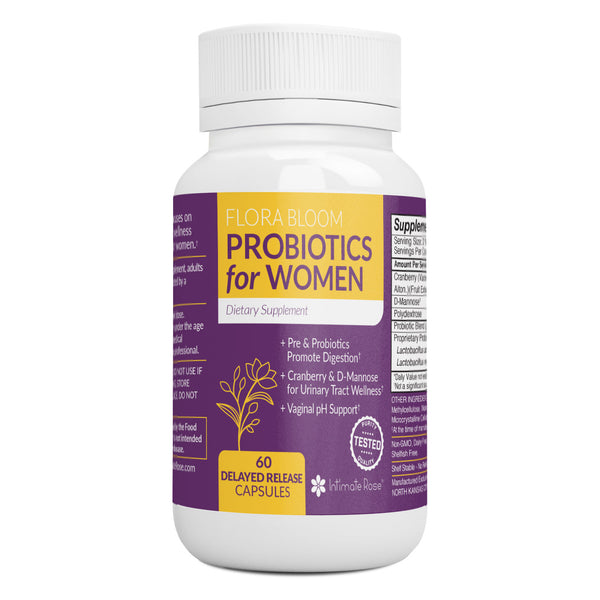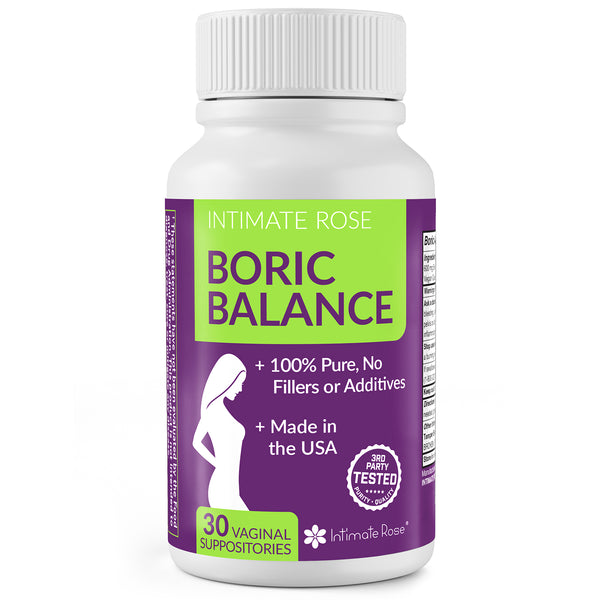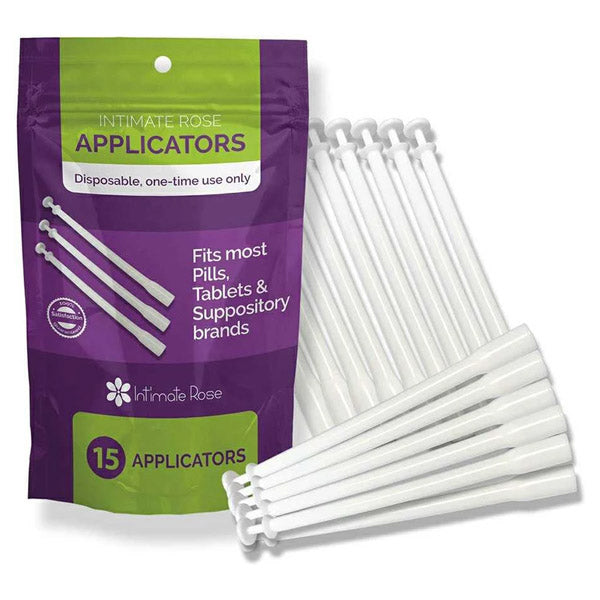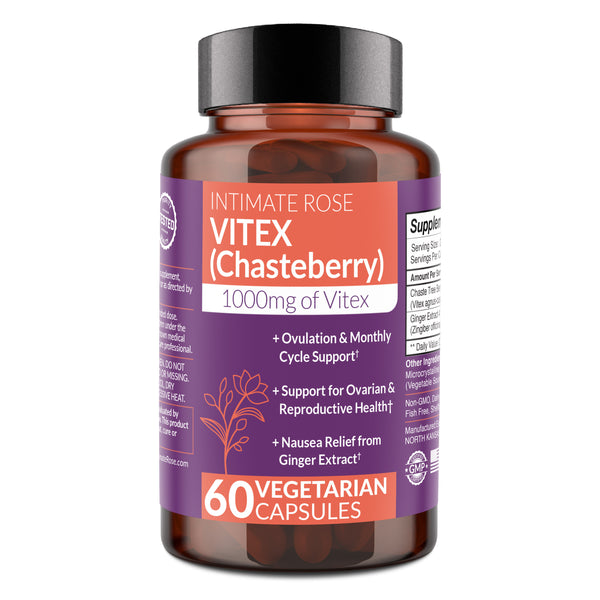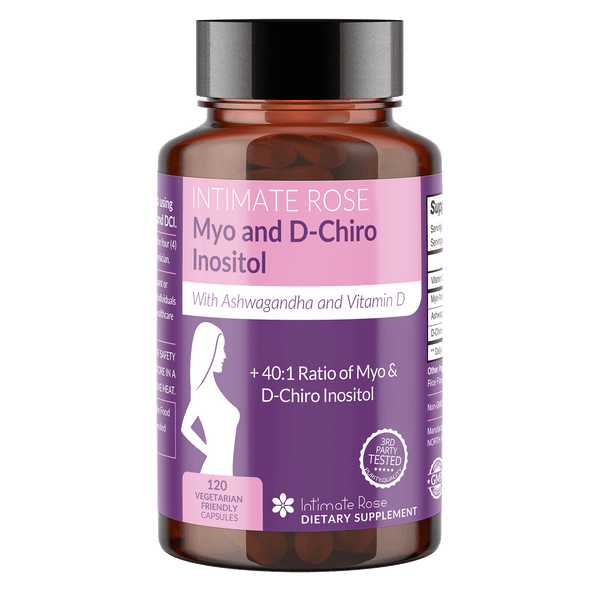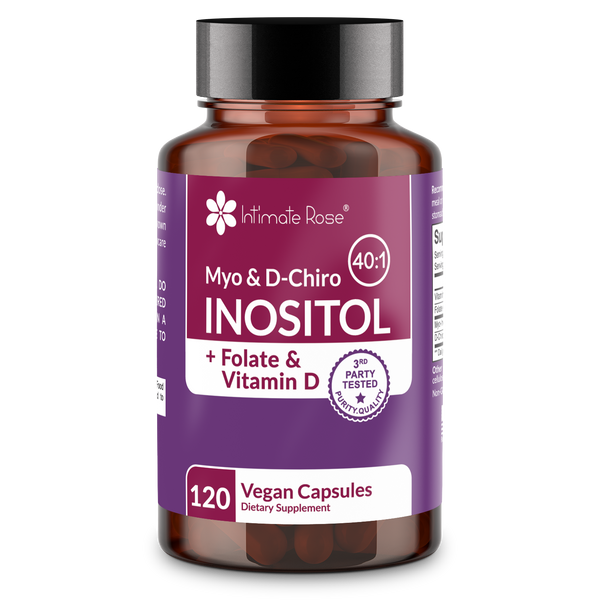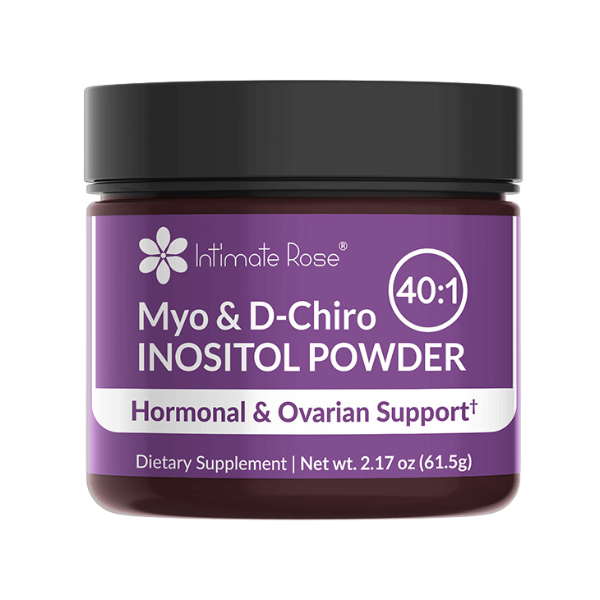Inositol is an over-the-counter supplement with many benefits. It’s commonly used to help people with polycystic ovarian syndrome (PCOS) and other metabolic or mental health conditions.
But in addition to all the above, can inositol help you lose weight? We looked into all the research about inositol and weight loss to find answers for you.
Things Off Down There?
Inositol for Weight Loss: The Basics
The primary way that inositol can promote weight loss has to do with insulin. That's because it plays a role in insulin regulation, which might help with weight management by improving the body's handling of glucose and reducing insulin resistance often seen in conditions like PCOS.
Although inositol is a natural sugar, inositol supplements contain a much higher quantity of myo-inositol than diet alone. Inositol supplementation also usually contains a blend of d-chiro-inositol in a 40:1 ratio with myo-inositol.
One study gave this 40:1 myo- and D-chiro-inositol ratio to rats that showed signs of PCOS and found that their PCOS symptoms were almost completely reversed within a very short time (Bevilacqua, Dragotto, Giuliani, & Bizzarri, 2019).
The effect was similar in a study of 46 obese patients with PCOS, showing a significant improvement in symptoms within six months of treatment (Benelli, Del Ghianda, Di Cosmo, & Tonacchera, 2016).
What Does Inositol Do?
You might be wondering how a natural sugar could possibly cause someone to lose weight. The answer lies within the hormone insulin. When you eat, your body starts to break down your food into sugar in your blood (blood glucose).
Your pancreas is then supposed to release insulin to help the body move sugar out of the bloodstream to turn it into energy for the rest of your body.
However, if you have a metabolic condition (like diabetes or PCOS), your pancreas may have trouble making insulin and your cells may find it harder to use insulin, known as “insulin resistance” (NIDDK, 2018).
Insulin Resistance
Insulin resistance is strongly associated with a higher weight; although you can have insulin resistance with a normal BMI, insulin resistance left unchecked can develop into weight gain and diabetes (Verkouter et al, 2019).
That’s where inositol comes in. Inositol can mimic the effects of insulin, so that even if your body has stopped responding to insulin, inositol can still perform a similar function and lower your blood glucose.
In fact, deficiencies in myo and D-chiro inositol have been linked not only to diabetic complications and insulin resistance, but also to certain mental disorders including depression, anxiety, Alzheimer’s disease, and bipolar disorder (Croze & Soulage, 2013).
Inositol for Metabolic Disorders
We can see the relationship between inositol, insulin, and metabolic disorders like diabetes and PCOS through studies of inositol supplementation.
One study of PCOS patients found that a 40:1 ratio of myo- and D-chiro-inositol could help reduce the risk of developing other metabolic disorders such as diabetes (Nordio & Proietti, 2012).
Inositol has also been used to prevent gestational diabetes (diabetes during pregnancy) and lower the risk of it developing into type 2 diabetes for either the parent or their child (Griffith et al, 2020).
And in addition, another study found that inositol can lower blood sugar in patients with type 2 diabetes (Pintaudi, Di Vieste, & Bonomo, 2016).
Inositol's Effect on Weight
Even if inositol didn’t help you lose weight, its potential for improving insulin sensitivity is great for your health overall.
Luckily, there is evidence that inositol can help you lose weight in combination with other lifestyle changes such as exercise and diet, and that this combination may work better than exercise and diet alone.
In one recent study of 43 higher weight PCOS patients, adding myo- and D-chiro-inositol to a 6 month weight loss plan sped up the weight loss and led to significantly better outcomes in restoring the participants’ menstrual cycles (Le Donne et al, 2019).
In addition, a 2007 study found that incorporating more nuts into an obese person’s calorie-restricted diet produced “a more lasting and greater magnitude of weight loss… while improving insulin sensitivity” (Rajaram and Sabate).
While the article did not specifically tie this effect to inositol, nuts are one of the highest sources of dietary myo-inositol.
How does the Inositol supplement work?
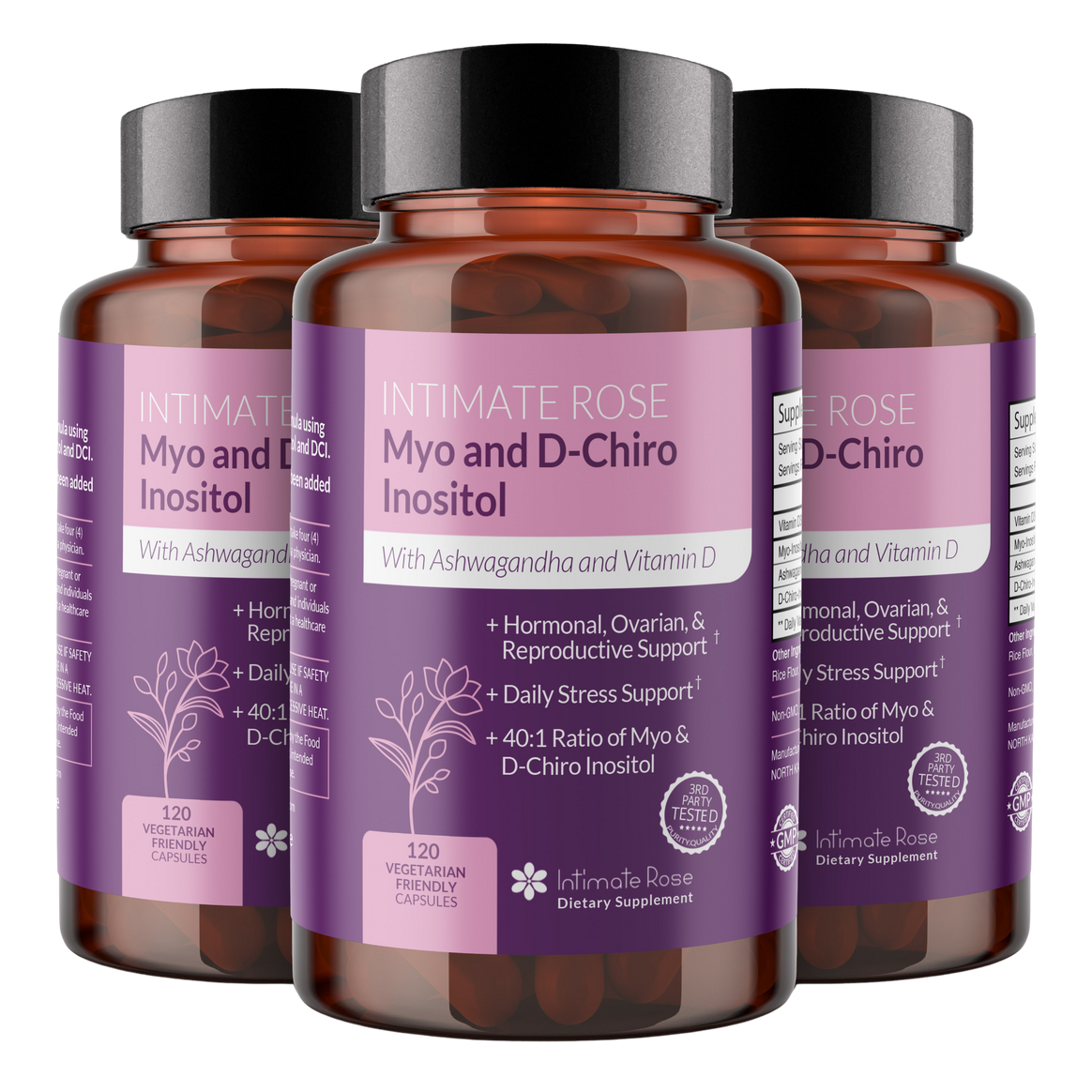
Conclusion
Much of the available research on the role of inositol in managing PCOS and other metabolic conditions is new, and we still need more research to confirm these early findings, though they are promising.
Inositol’s strong link to insulin and the link between inositol deficiency and metabolic disorders mean that it’s very possible that inositol can help you lose weight.
Inositol is a safe and affordable supplement; at the recommended dosage, those taking inositol often report no adverse side effects (Formoso et al, 2019).
That said, if your weight loss goals are tied to better health, make sure you don’t ignore your mental health in the process. There is a strong relationship between insulin resistance and the stress hormone cortisol (Paredes & Ribeiro, 2014).
Lowering the amount of stress in your life through self-care, better coping mechanisms, lifestyle changes, an improved support system, and/or therapy can significantly help your mental health, but it may also help your physical health and insulin resistance.
Exercise can also improve your mental health, and studies have shown that exercise can improve insulin sensitivity even if it does not lead to weight loss (Ross, 2003).
Whether you lose weight or not, know that healthy lifestyle changes, which can include taking inositol, can lead to better health overall.
References
- Clements Jr, R. S., & Darnell, B. (1980). Myo-inositol content of common foods: development of a high-myo-inositol diet. The American journal of clinical nutrition, 33(9), 1954-1967. https://doi.org/10.1093/ajcn/33.9.1954
- Bevilacqua, A., Dragotto, J., Giuliani, A., & Bizzarri, M. (2019). Myo‐inositol and D‐chiro‐inositol (40: 1) reverse histological and functional features of polycystic ovary syndrome in a mouse model. Journal of cellular physiology, 234(6), 9387-9398. https://doi.org/10.1002/jcp.27623
- Benelli, E., Del Ghianda, S., Di Cosmo, C., & Tonacchera, M. (2016). A combined therapy with myo-inositol and D-chiro-inositol improves endocrine parameters and insulin resistance in PCOS young overweight women. International journal of endocrinology, 2016.
- National Institute of Diabetes and Digestive and Kidney Diseases [NIDDK] (2018). Insulin Resistance & Prediabetes. https://www.niddk.nih.gov/health-information/diabetes/overview/what-is-diabetes/prediabetes-insulin-resistance
- Verkouter, I., Noordam, R., le Cessie, S., van Dam, R. M., Lamb, H. J., Rosendaal, F. R., van Heemst, D., & de Mutsert, R. (2019). The Association between Adult Weight Gain and Insulin Resistance at Middle Age: Mediation by Visceral Fat and Liver Fat. Journal of clinical medicine, 8(10), 1559. https://doi.org/10.3390/jcm8101559
- Croze, M. L., & Soulage, C. O. (2013). Potential role and therapeutic interests of myo-inositol in metabolic diseases. Biochimie, 95(10), 1811-1827. https://doi.org/10.1016/j.biochi.2013.05.011
- Nordio, M., & Proietti, E. (2012). The combined therapy with myo-inositol and D-chiro-inositol reduces the risk of metabolic disease in PCOS overweight patients compared to myo-inositol supplementation alone. European review for medical and pharmacological sciences, 16(5), 575–581.
- Griffith RJ, Alsweiler J, Moore AE, Brown S, Middleton P, Shepherd E, Crowther CA (2020). Interventions to prevent women from developing gestational diabetes mellitus: an overview of Cochrane Reviews. Cochrane Database of Systematic Reviews 2020, Issue 6. Art. No.: CD012394 https://doi.org/10.1002/14651858.CD012394.pub3
- Pintaudi, B., Di Vieste, G., & Bonomo, M. (2016). The Effectiveness of Myo-Inositol and D-Chiro Inositol Treatment in Type 2 Diabetes. International journal of endocrinology, 2016, 9132052. https://doi.org/10.1155/2016/9132052
- Le Donne, M., Metro, D., Alibrandi, A., Papa, M., & Benvenga, S. (2019). Effects of three treatment modalities (diet, myoinositol or myoinositol associated with D-chiro-inositol) on clinical and body composition outcomes in women with polycystic ovary syndrome. European review for medical and pharmacological sciences, 23(5), 2293–2301. https://doi.org/10.26355/eurrev_201903_17278
- Rajaram, S., & Sabaté, J. (2006). Nuts, body weight and insulin resistance. British Journal of Nutrition, 96(S2), S79-S86. https://doi.org/10.1017/BJN20061867
- Paredes, S., & Ribeiro, L. (2014). Cortisol: the villain in metabolic syndrome?. Revista da Associação Médica Brasileira, 60(1), 84-92. http://dx.doi.org/10.1590/1806-9282.60.01.017
- Ross, R. (2003). Does exercise without weight loss improve insulin sensitivity?. Diabetes Care, 26(3), 944-945. https://doi.org/10.2337/diacare.26.3.944
- Formoso, G., Baldassarre, M., Ginestra, F., Carlucci, M. A., Bucci, I., & Consoli, A. (2019). Inositol and antioxidant supplementation: Safety and efficacy in pregnancy. Diabetes/metabolism research and reviews, 35(5), e3154. https://doi.org/10.1002/dmrr.3154

Things Off Down There?




